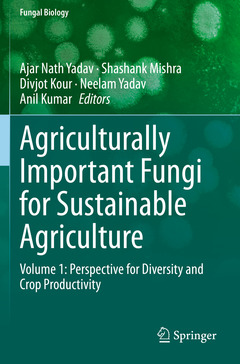Agriculturally Important Fungi for Sustainable Agriculture, 1st ed. 2020 Volume 1: Perspective for Diversity and Crop Productivity Fungal Biology Series
Coordonnateurs : Yadav Ajar Nath, Mishra Shashank, Kour Divjot, Yadav Neelam, Kumar Anil

Microbes are ubiquitous in nature. Among microbes, fungal communities play an important role in agriculture, the environment, and medicine. Vast fungal diversity has been associated with plant systems, namely epiphytic fungi, endophytic fungi, and rhizospheric fungi.
These fungi associated with plant systems play an important role in plant growth, crop yield, and soil health. Rhizospheric fungi, present in rhizospheric zones, get their nutrients from root exudates released by plant root systems, which help with their growth, development, and microbe activity. Endophytic fungi typically enter plant hosts through naturally occurring wounds that are the result of plant growth, through root hairs, or at epidermal conjunctions. Phyllospheric fungi may survive or proliferate on leaves depending on material influences in leaf diffuseness or exudates.
The diverse nature of these fungal communities is a key component of soil-plant systems, where they are engaged in anetwork of interactions endophytically, phyllospherically, as well as in the rhizosphere, and thus have emerged as a promising tool for sustainable agriculture. These fungal communities promote plant growth directly and indirectly by using plant growth promoting (PGP) attributes. These PGP fungi can be used as biofertilizers and biocontrol agents in place of chemical fertilizers and pesticides for a more eco-friendly method of promoting sustainable agriculture and environments.
This first volume of a two-volume set covers the biodiversity of plant-associated fungal communities and their role in plant growth promotion, the mitigation of abiotic stress, and soil fertility for sustainable agriculture. This book should be useful to those working in the biological sciences, especially for microbiologists, microbial biotechnologists, biochemists, and researchers and scientists of fungal biotechnology.
Ajar Nath Yadav is an Assistant Professor (Sr. Scale) in Department of Biotechnology, Dr. Khem Singh Gill Akal College of Agriculture, Eternal University, Baru Sahib, Himachal Pradesh, India. He has 4 years of teaching and 10 year of research experiences in the field of Microbial Biotechnology, Microbial Diversity, and Plant-Microbe-Interactions. Dr. Yadav obtained doctorate degree in Microbial Biotechnology, jointly from IARI, New Delhi and BIT, Mesra, Ranchi, India; M.Sc. (Biotechnology) from Bundelkhand University and B.Sc. (CBZ) from University of Allahabad, India. Dr. Yadav has 136 publications, which include 69 research/review papers, 11 books, 54 book chapters, and 02 patents with h-index of 27, i10-index of 64, and 2287 citations (Google Scholar). Dr. Yadav has published 111 research communications in different international and national conferences. Dr. Yadav has got 12 Best Paper Presentation Awards, and 01 Young Scientist Award (NASI-Swarna Jyanti Purskar).Dr. Yadav received “Outstanding Teacher Award” in 6th Annual Convocation 2018 by Eternal University, Baru Sahib, Himachal Pradesh. He has been serving as an editor/editorial board member and reviewer for more than 35 national and international peer-reviewed journals. He has lifetime membership of Association of Microbiologist in India, and Indian Science Congress Council, India.
Shashank Mishra is presently working as Scientist ‘C’, Biotech Park, Lucknow, Uttar Pradesh, India. He obtained his doctorate degree in Science “Industrial Biotechnology” in 2015, from Birla Institute of Technology, Mesra, Ranchi, India; M.Phil. (Biotechnology) in 2008 from Alagappa University, Tamil Nadu; M.Sc. (Botany), in 2005 from Dr. R.M.L. University, Ayodhya; M.Sc. (Biotechnology), in 2004 from Barkatullah University, Bhopal and B.Sc. (Botany and Chemistry) in 2001 from Dr. R.M.L. University, Ayodhya, India. He has made pioneering contributions in the area of MicrobialBiotech
Date de parution : 06-2021
Ouvrage de 300 p.
15.5x23.5 cm
Date de parution : 06-2020
Ouvrage de 300 p.
15.5x23.5 cm



